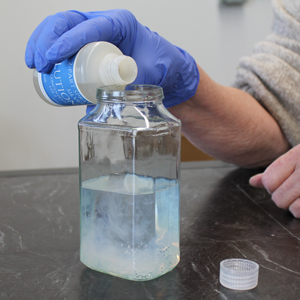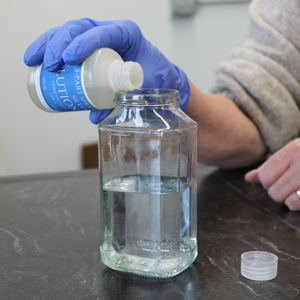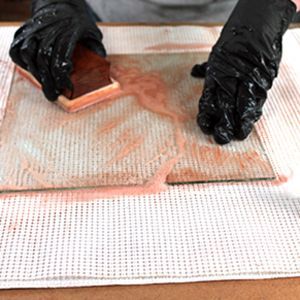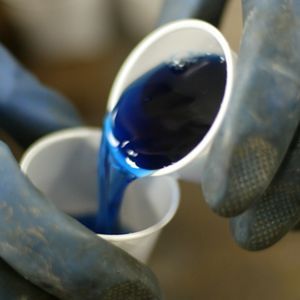About Water Purity


Mirroring is a water-based process. The quality of the water is important. Bottled water that is not steam distilled or de-ionized is not pure enough for mirroring.
You must use steam distilled or de-ionized water for mirroring.
This photo shows that tap water turns milky white when you add a few drops of Silver Solution.
A Simple Water Test
- Pour a little of the water you plan to use for mirroring into a disposable transparent cup.
- Add a few drops of Silver Solution.
- If the water turns white and cloudy, it is not pure enough for mirroring.
- If the water does not change color, it is pure enough.
Why water quality matters
Mirroring chemicals contain metal salts dissolved in water. When the salts combine with other mirroring chemicals, the metal comes out of solution and deposits on the glass. The reaction does not work properly when there are unknown chemicals, especially other metal salts, present in the mix.
Using a TDS (total dissolved solids) meter
A TDS meter will tell you if your water is pure enough for mirroring, but we do not think it is necessary. The silver molecules in our silver solutions will do the same thing for much less money. After all, it is the way that the silver reacts with the water that matters. Only some problems with the mirroring process are caused by impure water.
Treating waste water
Removing heavy metals from the water we all drink is important. Our Waste Treatment Kit does just that. The clay in the Kit is specially formulated to bind and isolate heavy metals. Used clay can be safely put in the solid trash. Treated, filtered waste water can be safely poured down the drain. See our Waste Treatment Instructions for details.
Water for cleaning
You do not need to use pure water to clean the glass. Hot tap water works fine for scrubbing and polishing. You must remove the tap water by rinsing the glass thoroughly with pure (distilled) water before you proceed with tinning and mirroring it. Spraying the glass with purified water is the most efficient and cost effective way to rinse it. Water used for cleaning can go directly into the public sewer.
Water purification techniques
Distillation
Distilled water is condensed from steam. Impurities that don’t evaporate, like sodium chloride in sea water and metal leached from plumbing pipes, are removed. Some volatile compounds like hydrocarbons and solvents remain, but these do not affect the mirroring process. Steam distilled water is sold in many supermarkets for ironing clothes and washing windows and cars. Steam distilled water is usually the best and cheapest option for mirroring.
De-ionization
Deionized water is filtered through ion exchange resins that bind and filter out mineral salts leaving the water almost as pure as distilled water. This kind of water is also called “demineralized” or “de-mineralized”. The resins are also called “water softeners” and are usually packed into a long tube with the water running through it. After a time the resin has bound as much of the mineral content as it can and has to be refreshed. While expensive, a deionizing column produces water pure enough for mirroring.
Reverse osmosis
This is a relatively new technique in water purification which mechanically removes large particles by forcing the contaminated water through a membrane which allows the small water molecules to pass through but not the larger salt and organic molecules. It is the ways the kidneys in your body remove waste products and is used in dialysis machines. It does not involve adding any chemicals or boiling but the membrane eventually gets clogged and must be replaced.
Household filters
Standard household water filters use activated carbon to remove chlorine, particulates and volatile organic compounds from tap water. Because they do not remove minerals and other dissolved inorganic salts, they do not produce water that is pure enough for mirroring.
Rain water
Rain water and tap water contain dissolved organic and inorganic compounds. While many of these are essential for human health, they can seriously affect the mirroring process. Water for mirroring needs to be pure; it does not need to be sterile. Most biological contaminants will not affect the process.




